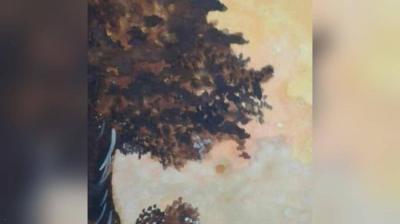Under the title "Through Acting, Poetry, and Painting... The Story of a Deaf Libyan Woman Who Amazed Benghazi," Sky News published a report on Libyan artist Fatima Darz. The report highlighted the three unique talents of Benghazi native Fatima Darz, who has etched her name in gold as one of the prominent figures of this coastal city in eastern Libya due to her excellence in acting, poetry writing, and her golden touch in renewing various forms of painting, despite being born with a hearing impairment.
On April 15th, coinciding with World Art Day, the artist called upon all individuals with disabilities around the world to believe in themselves and develop their talents, emphasizing that everyone possesses hidden energy and abilities that can be nurtured through experience and continuous training, and that no barrier should hinder them from achieving their goals.
Darz stated in an exclusive statement to Sky News Arabia that she has memories from her childhood that encouraged her to establish her talent after experiencing a strange childhood, saying: "In my childhood, I studied in a boarding school in the Lebanese capital Beirut, and I have beautiful memories there as my teachers supported and encouraged my talents in drawing and gymnastics. However, I stopped gymnastics when I left school due to the civil war in 1975."
She added, "I returned to Benghazi at a young age, and after a period of pause, I felt a longing for drawing and colors, and my passion for painting was rekindled. My father provided me with what I needed in terms of painting supplies and encouraged me to continue despite the difficulties. I began to develop my skills on my own and found encouragement from everyone. I showcased my drawings at an exhibition for the deaf in Benghazi, but I did not master color mixing correctly due to the lack of specialized teachers to teach these skills. The situation continued that way until I was 12 years old, when I happened to see an artist mixing colors, and I learned from him the skills of mixing oil and watercolor among others. When I turned 16, I started exhibiting my paintings at the Deaf Association in Benghazi, and I was classified as the first deaf Libyan painter."
On stage, Darz stated: "After that, I loved the experience of acting and joined the Institute's theater team. I gained the admiration of the teachers at that time, and the seed of acting began to grow within me. In 1985, I presented a play at the Deaf Institute in Benghazi, which was the first mime play in the Arab world, and I played the lead role. The level of the play was artistically no less than any spoken play, which increased my happiness and boosted my confidence in myself and my abilities, but in 1987 I stopped acting."
She continued: "After that, I worked as a theater teacher at the Deaf Institute, but due to a lack of support, I stopped working and devoted myself to painting until 2011 with the start of the revolutions, during which I exhibited my paintings in many exhibitions. During this period, I started writing poetry and thoughts, and with encouragement from my sister, who insisted that I participate in poetry evenings, I hesitated at first but finally agreed to go with her. I was overwhelmed by shyness from the audience's gaze, but I eventually gained the courage to stand and recite my words in sign language while my sister translated them into spoken words. I was surprised by the warm applause from the audience and their positive comments, especially as the work illustrated the struggles of a deaf person, which restored my self-confidence and belief in my abilities. However, over time, I began to feel marginalized again."
During her conversation, she mentioned, "I made a final decision not to wait for anyone's support and turned to social media to make friends with painters and artists and to seek out talents among the deaf who share my dream."
She added, "However, most of the deaf individuals I contacted did not share common talents with me until I stumbled upon a post by Professor Mohamed Abu Zahra, which I liked its content. We became friends on Facebook, and I later discovered that he was a creative artist. At that time, I asked him to create a group for talented Arab deaf individuals to get to know each other, share ideas, and exchange experiences."
She concluded: "Despite his many responsibilities, he agreed, and this group was one of the best things that happened to me in my life, as I made wonderful, creative friends."




